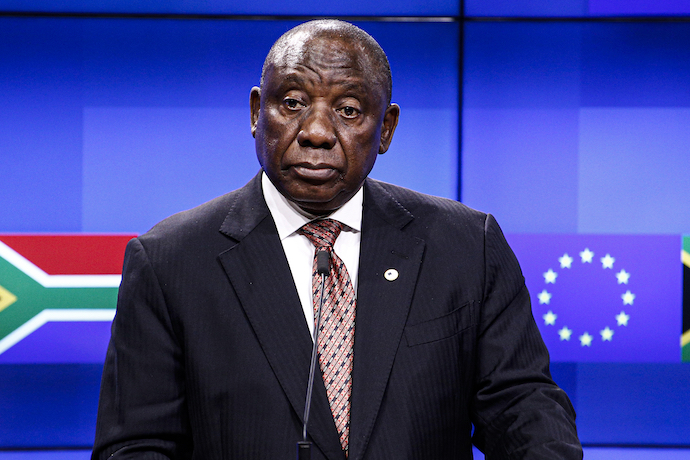
Echoes Across Continents: The Political Landscapes of the U.S. and South Africa
At a glance, the political climates of the United States and South Africa may seem worlds apart, geographically and culturally. Yet, as these nations approach what is arguably their most critical elections to date, a common narrative of uncertainty about the future and the integrity of democracy itself begins to unfold, revealing striking parallels.
My decade-long residence in South Africa, spanning 2005 to 2015, offered me a front-row seat to the nation’s vibrant diversity, natural splendor, and the palpable promise of progress. It was a time of personal milestones, set against the backdrop of the 2010 FIFA World Cup. However, this period also brought me face-to-face with the challenges of poor governance, economic instability, and rising crime, ultimately leading my family to reassess our future direction.
Fast forward to the present, my journey has taken me 9,150 miles away to Austin, Texas, where the echo of South Africa’s challenges resounds amidst my foray into politics. The global stage is set for pivotal elections: South Africa stands on the cusp of a defining political moment as the nation prepares for its elections on May 29, a day set to shape the national and provincial leadership landscape. The African National Congress (ANC), a party with a long-standing grip on power since the historic 1994 elections, is bracing for a formidable challenge that could recalibrate the political equilibrium.
Simultaneously, the United States is gearing up for its presidential election on November 5, an event that carries significant weight in determining the country’s trajectory and its role on the world stage. The outcomes of these elections will not only reflect the current political sentiments within each country but also signal potential shifts in their respective regions and the broader international community.
During my time in South Africa, my interactions with officials from the African National Congress officials and Democratic Alliance, the main opposition party, representatives were frequent and insightful. These interactions offered a firsthand look at the political dynamics shaping the nation. The Democratic Alliance’s recent request of American oversight for the country’s impending elections speaks to a longstanding concern: the quest for unblemished democratic processes in a landscape marred by allegations of corruption and subpar public service, a narrative that has clung to the ANC for decades.

Yet, this scrutiny of governance is not confined to the South African realm. The United States is wrestling with its internal challenges, where the specter of corruption, albeit more obfuscated by political donations and other mechanisms, is a reality that calls for diligent financial scrutiny. The proverbial “piper” in American politics, it seems, plays tunes reminiscent of those heard abroad.
Further evidence of the shared democratic distress is found in the pervasive disquiet among American voters, many of whom are voicing their exasperation with the trajectory of the country. A staggering 65% of Americans reportedly feel a sense of political fatigue “always” or “often,” while a mere 4% express confidence that the U.S. political system is functioning “extremely” or “very well.” These statistics are a telling barometer of public sentiment and underscore the universal nature of the challenges faced by democracies today.
In the wake of a confluence of critical events, my decision to pursue a career in politics was a deliberative response to the mounting challenges facing our society. The government’s missteps during the pandemic, the contentious debates over public safety funding in Austin, and the social media storms—most notably those involving Twitter—have illuminated the fissures in our political and social fabric, particularly those widened by polarizing ideologies.
Conversely, Texas has charted a course of economic success in the post-pandemic era. The state has become a magnet for major corporations, including Elon Musk’s Tesla and SpaceX. This influx, alongside a bolstered energy sector, has reinvigorated the state’s financial reserves, propelling the Texas economy to over $2.4 trillion and positioning it to overtake France as the world’s seventh-largest economy.
As a candidate for State Representative, I recognize the critical stewardship role this office holds—particularly in the allocation of Texas’s burgeoning surplus. With infrastructure calling for urgent investment, the imperative is clear: to strategically channel these funds into fortifying the state’s foundation for future growth and stability.
Residing on the outskirts of Johannesburg, my family once contended with the persistent inconvenience of load shedding. This disruption has since escalated; Eskom, South Africa’s primary energy supplier, has instituted near-daily power cuts from 2022, at times lasting up to 10 hours—a measure ostensibly to avert a total collapse of the grid.
The crisis, however, extends beyond electricity. A broader spectrum of South African infrastructure is in a state of decline, with water systems, railways, roads, and ports suffering from neglect and the inefficient deployment of human resources, culminating in a critical situation.
This narrative resonates in Texas, where my concerns are particularly acute regarding water supply. Despite a proactive $1 billion investment to revitalize aging water systems, the state faces a staggering $18 billion shortfall to merely sustain existing infrastructure, a calculation not accounting for the demands of demographic expansion and climatic shifts. The looming question is how Texas will navigate these imminent challenges to secure a resilient future for its residents.
The 2021 American Report Card on Infrastructure has handed down a sobering assessment of Texas’s vital systems, assigning grades that signal an urgent call for remedial action. With a D+ in dam safety, a C- in drinking water quality, and a D in wastewater treatment, the report casts a stark light on the state’s infrastructure woes. The grading indicates a scenario where Texas’s infrastructure hovers between poor to fair conditions, with a significant portion on the brink of failure due to age and neglect.
Mirroring Texas’s concerns is the perennial issue of border security, a challenge it shares with South Africa. Stretching approximately 1,997 kilometers, Texas’s border represents about half of the U.S.-Mexico divide, a counterpart to South Africa’s extensive 4,862-kilometer perimeter. Both nations grapple with the complexities of illegal immigration, as economic disparities drive individuals to seek better prospects within their borders, often in pursuit of even the most humble occupations. This underscores the broader theme of regional economic imbalances and the magnetic pull of urban economic hubs.
The numbers chronicling undocumented immigrants in South Africa, paralleling the uncertainty of American statistics, remain a subject of debate. Estimates suggesting the presence of up to 15 million undocumented immigrants in South Africa have been contested by fact-checking organizations as excessively inflated. In the United States, the figures fluctuate between 11 to 17 million. This discourse occurs against the demographic backdrop of South Africa’s 60 million residents and America’s population of 332 million, with Texas alone being home to 30 million people.
Amidst this statistical ambiguity, the specter of xenophobia casts a shadow over the immigration dialogue. Recalling the events of 2008, when xenophobic violence erupted within mere miles of my South African residence, resulting in the death of 62 people, the threat of such hostility looms large. Experts caution that such attacks could be inflamed by electoral campaign rhetoric, underlining the volatility that accompanies the confluence of immigration policy and national sentiment.
In the United States, the concern over unauthorized immigrants is multifaceted, with fears not only about job competition and taxpayer burdens but also national security threats posed by potential terrorist entries via porous borders. This anxiety extends to foreign powers like China, Iran, and Russia acquiring U.S. land and wielding influence over essential sectors, including food supply and communications infrastructure.
The specter of disinformation looms large, with foreign entities, particularly from Russia, accused of sowing discord through targeted misinformation campaigns. These efforts are designed to polarize and sow distrust, as highlighted by the U.S.-based Africa Center for Strategic Studies, which contends that Russia aims to bolster the ANC’s standing in South Africa by disseminating favorable narratives and exploiting local influencers.
Navigating the murky waters of truth and falsehood has become a Herculean task for the American public in 2024, with the distinction between fact and fake news increasingly blurred.
Beyond the realm of misinformation, tangible issues like inefficient public services, soaring unemployment, and escalating crime rates starkly contrast with the nebulous nature of disinformation. South Africa confronts these challenges head-on, with an unemployment rate estimated at 32 percent dwarfing America’s 3.9 percent, and a homicide rate of 45 per 100,000 people far exceeding the U.S. rate of 6.3 and the lower figures prevalent across Europe.
The words of a fictional character from the film World War Z encapsulate a prevalent human tendency: “Most people don’t believe something can happen until it already has. That’s not stupidity or weakness, it’s just human nature.”
The parallel challenges facing America and South Africa—stemming from unauthorized immigration, pervasive corruption, and disinformation—necessitate decisive action. The path forward involves significant investment in education and infrastructure to prepare for an uncertain future, a complex endeavor, but one without alternatives.
